Not all ‘nones’ are nonbelievers.
Far from it.
While the “nones” include many nonbelievers, 70% of “nones” say they believe in God or another higher power, and 63% say they believe in spiritual forces beyond the natural world.
Overall, 19% of religious “nones” are strict nonbelievers who don’t believe in God or any higher power, don’t believe humans have souls, don’t think there’s anything beyond the natural world, don’t think there’s a heaven and don’t believe in hell.
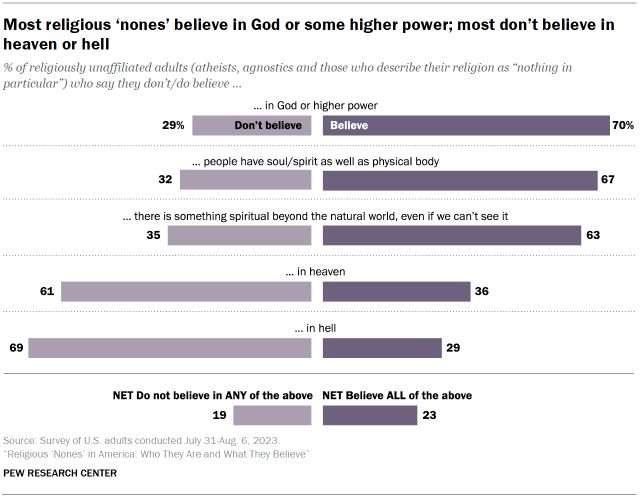
But 23% of “nones” say they believe in all of the above. The rest either hold some of those beliefs and reject others (55%) or else don’t answer enough of the questions to be able to classify the nature of their beliefs (3%).
But ‘nones’ are much less religious, on average, than religiously affiliated Americans.
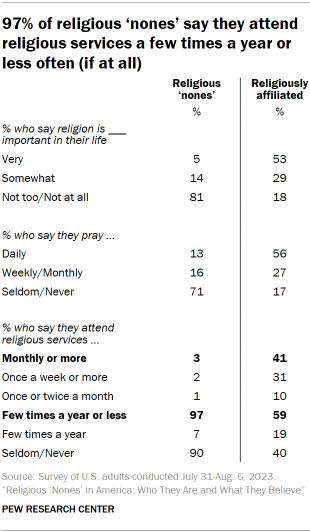
About three-in-ten religious “nones” say they pray with some regularity, but most “nones” don’t. Fully 71% say they seldom or never pray.
While about one-fifth of “nones” say religion is either very or somewhat important in their lives, four times as many say religion is not too or not at all important to them (81%).
And very few “nones” say they attend religious services. Just 3% say they go to religious services once a month or more, while 97% go a few times a year or less (including 90% who say they seldom or never attend religious services).
On all these measures, religious “nones” are far less religious than Americans who identify with a religion. So religious “nones” don’t just avoid or reject religious labels. They also avoid or reject some common religious behaviors.
Beliefs about God
Seven-in-ten “nones” believe in God or a higher power of some kind, including 13% who say they believe in God “as described in the Bible” and 56% who say they don’t believe in God as described in the Bible but do believe in some other higher power.
About three-in-ten “nones” say they don’t believe in God or any “higher power or spiritual force in the universe.”
Most agnostics (67%) and U.S. adults who describe their religion as “nothing in particular” (83%) say they believe in God or some kind of higher power. Among atheists, almost none say they believe in God as described in the Bible, but 22% say they do believe in some other higher power or spiritual force in the universe.
Among “nones,” more men than women say they don’t believe in God or any higher power at all (36% vs. 21%). “Nones” who are women are instead more likely than “nones” who are men to believe in a higher power other than God as described in the Bible (63% vs. 51%).
There is little difference across age groups in the share of “nones” who believe in any higher power. But there are some modest differences across age categories in the share who believe in God as described in the Bible, as opposed to some other kind of higher power. The youngest “nones” are more likely than the oldest “nones” to say they believe in a higher power other than God as described in the Bible, while the oldest are more inclined than the youngest to believe in the biblical God.
Nine-in-ten Black “nones” and 81% of Hispanic “nones” believe in some higher power, but Black “nones” are more likely than Hispanic “nones” to say they believe in God as described in the Bible (34% vs. 19%).
Smaller majorities of both White and Asian “nones” (64% each) believe in a higher power.
Six-in-ten “nones” who are college graduates say they believe in a higher power, while 39% do not. Belief in a higher power is more common among “nones” with lower levels of formal education.
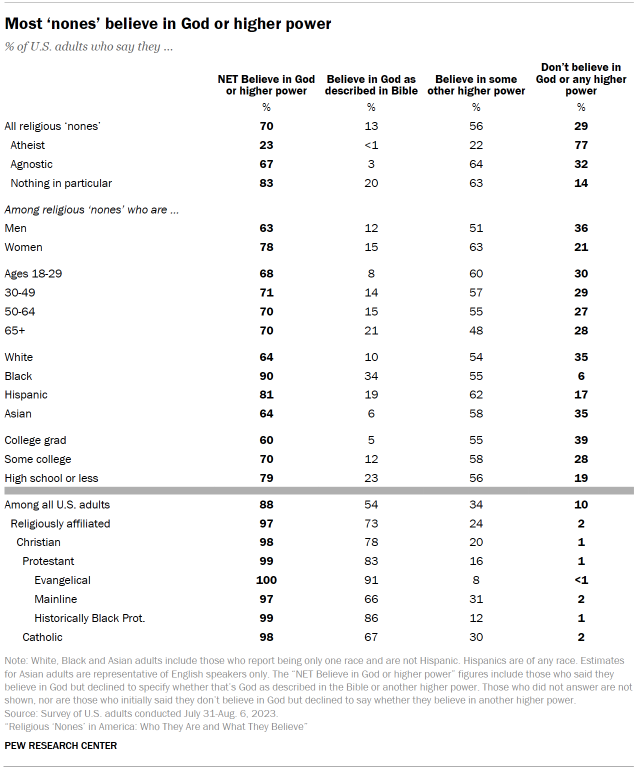
Views on the existence of something spiritual beyond the natural world
Overall, 63% of religious “nones” say there is something spiritual beyond the natural world, even if we can’t see it, while 35% express the materialist perspective, saying the natural world is all there is.
Most atheists say the natural world is all that exists. But most agnostics and those who describe their religion as “nothing in particular” say there is something spiritual beyond the natural world.
Among “nones,” women are more likely than men to say there is something spiritual beyond the natural world (72% vs. 56%).
Large majorities of “nones” who are Black or Hispanic believe there is something spiritual beyond the natural world, even if we can’t see it. Fewer White “nones” and Asian “nones” believe this.
Religious “nones” who are college graduates are evenly divided between those who think there is something spiritual beyond the natural world (50%) and those who think the natural world is all there is (49%). By contrast, a clear majority of “nones” with less than a college education say there is something spiritual beyond the natural world, even if we can’t see it.

Beliefs about whether humans have a soul or spirit
Roughly two-thirds of “nones” say they think humans have souls or spirits in addition to their physical bodies. This includes 60% of agnostics and 78% of U.S. adults whose religion is “nothing in particular.” By comparison, 31% of atheists believe a person has a soul or spirit in addition to a body.
Among “nones,” women are more likely than men to believe humans have souls or spirits. Black and Hispanic “nones” are more likely than White and Asian “nones” to believe this. And “nones” who have not completed college are more likely than college graduates to express this view.
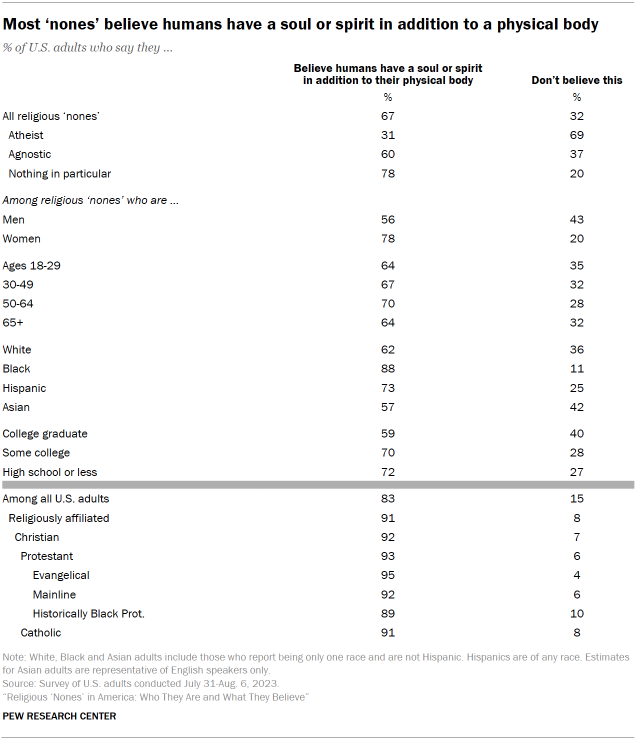
Beliefs about heaven and hell
Among religious “nones,” 36% say they believe in heaven and 29% say they believe in hell.
Half of those whose religion is “nothing in particular” believe in heaven, and 41% believe in hell. Far fewer atheists and agnostics believe in either heaven or hell.
“Nones” who are women are far more likely than “nones” who are men to believe in heaven and hell.
Black and Hispanic “nones” are each more likely to believe in heaven and hell than are White and Asian “nones.”
Among “nones” with a high school education or less, 55% say they believe in heaven, and 46% believe in hell. Far fewer “nones” with college experience believe in either.
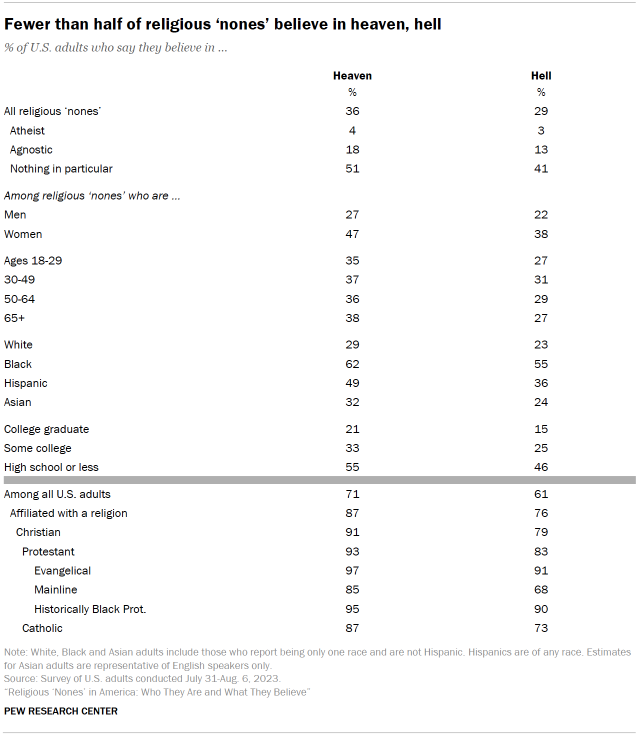
Overall religious commitment
We often combine questions about rates of religious attendance, frequency of prayer and religious importance to categorize Americans by their level of “religious commitment.” Though these are not the only possible measures of religious commitment, combining these three is a helpful way to see if there are clear patterns of religious engagement across different parts of the population.
In this analysis, U.S. adults who say they attend religious services at least once a week, pray daily and consider religion to be very important in their lives are categorized as having high religious commitment.
Those who say they seldom or never attend religious services, seldom or never pray, and consider religion to be not too or not at all important in their lives are categorized as having low religious commitment.
Everyone else – those who fall between the high category on one end and the low category on the other – are counted as having medium religious commitment.
A majority of “nones” (64%) fall in the low commitment category, while 35% fall in the medium category. Just 1% of “nones” exhibit high levels of religious commitment.
Half of those who identify religiously as “nothing in particular” exhibit low levels of religious commitment, and 47% exhibit a medium level of religious commitment. Most atheists and agnostics have low religious commitment.
There are big differences in the religiousness of “nones” across racial categories. A clear majority of Black “nones” (69%) fall into the medium religious commitment category, making them the “most religious” of all demographic groups analyzed. About half of Hispanic “nones” fall in the medium religious commitment category, while most White and Asian “nones” display low levels of religious commitment.
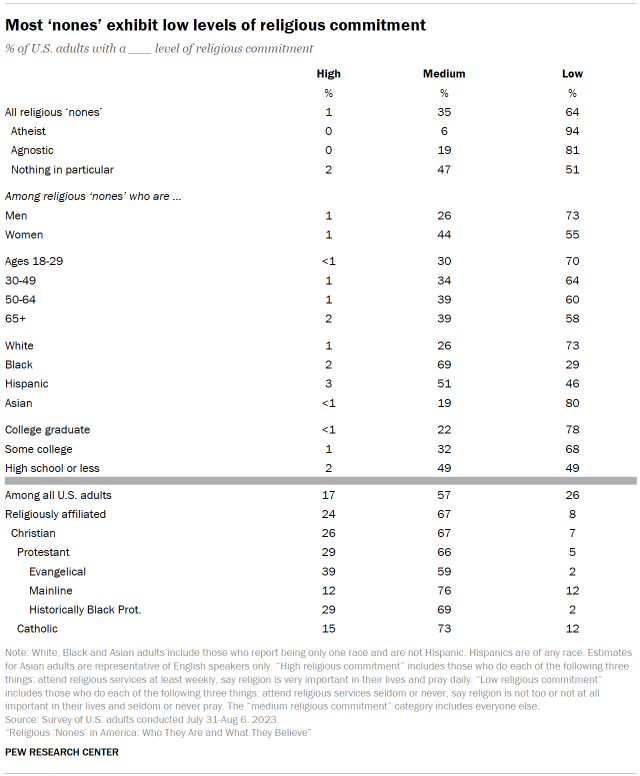
Religious attendance
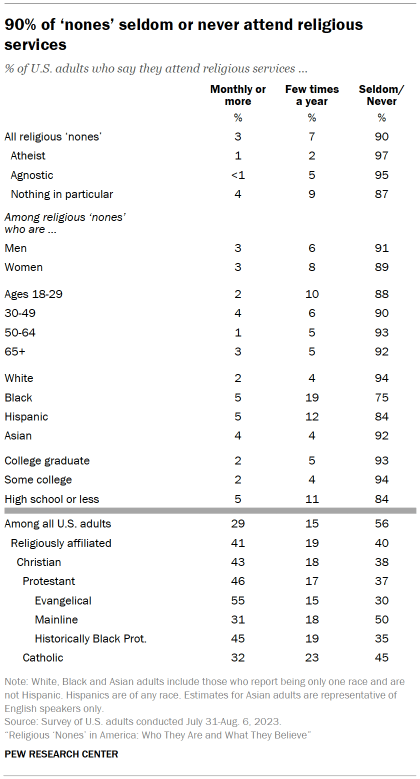
Very few “nones” attend religious services with any regularity. Fully 90% say they seldom (24%) or never (67%) attend religious services.
There are differences in rates of religious attendance by race and ethnicity.
About a quarter (24%) of Black “nones” say they attend religious services at least a few times a year, as do 16% of Hispanic “nones.” By contrast, just 6% of White “nones” and 8% of Asian “nones” report going to a church, synagogue, mosque, temple or other house of worship a few times a year or more often.
Frequency of prayer
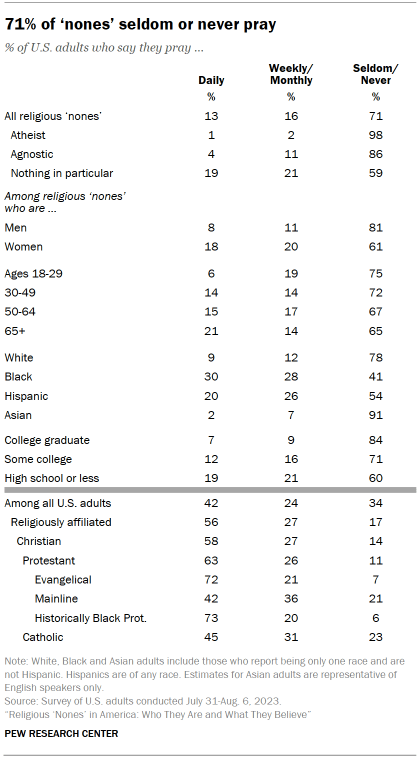
Around seven-in-ten “nones” say they seldom or never pray. Roughly three-in-ten say they pray each day (13%) or on a weekly or monthly basis (16%).
As with most other religion measures, “nones” who identify as “nothing in particular” are far more likely to say they pray than atheists or agnostics. About one-fifth (19%) of adults in the “nothing in particular” category say they pray daily.
When looking at religious “nones” of different demographic backgrounds, Black Americans, women and those with lower levels of educational attainment are more likely than their counterparts to say they pray at least monthly.
Religion’s importance
Around eight-in-ten religious “nones” say religion is not too or not at all important in their lives, while 19% say religion is somewhat or very important to them.
“Nones” who describe their religion as “nothing in particular” are more likely than atheists and agnostics to say religion is at least somewhat important to them. Still, even among those who identify as “nothing in particular,” most say religion is not too important or not at all important.
Nearly one-fifth of Black “nones” (19%) say religion is very important, while an additional 26% say it is somewhat important. This level of importance attributed to religion is much higher than for “nones” in other racial groups, particularly White and Asian “nones.”
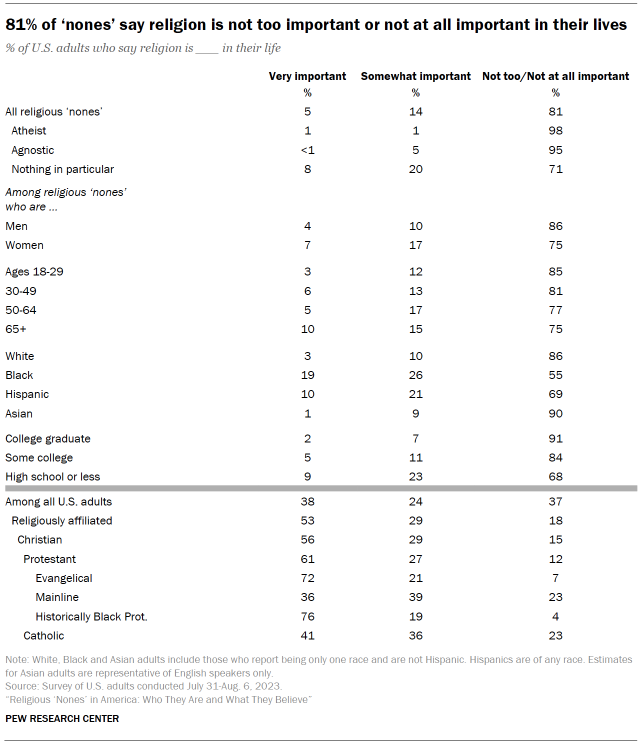
Return to the report’s Overview.
Find answers to other questions:
- Who are the ‘nones’? How are they defined? (Chapter 1)
- Why are ‘nones’ nonreligious? (Chapter 2)
- Are ‘nones’ less involved in civic life than people who identify with a religion? (Chapter 3)
- Are ‘nones’ spiritual instead of religious? (Chapter 5)
- Are ‘nones’ hostile toward religion? (Chapter 6)
- How do ‘nones’ view science? (Chapter 7)
- How do ‘nones’ think about morality? (Chapter 8)




